|
|
|
Sort Order |
|
|
|
Items / Page
|
|
|
|
|
|
|
| Srl | Item |
| 1 |
ID:
134072
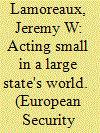

|
|
|
|
|
| Publication |
2014.
|
| Summary/Abstract |
The interest in small states ebbs and flows as important international affairs include small states. Russia's actions and policies vis-à-vis Ukraine, and the resultant intensified apprehension among Russia's smaller neighbours, aim the proverbial microscope at the size and power discrepancies between states. Russia, by most metrics, is a large state and the Baltic states, by those same metrics, are small states. Small-state scholars expect large and small states to act differently. However, the case of Russia and the Baltic states indicates that large and small states do not, in fact, act all that different. This being the case, this article calls into question many of the assumptions made by small-state scholars about the difference between large- and small-state action and argues for changes within small-state studies as a subdiscipline of the larger international relations discipline.
|
|
|
|
|
|
|
|
|
|
|
|
|
|
|
|
| 2 |
ID:
133845
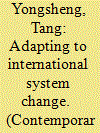

|
|
|
|
|
| Publication |
2014.
|
| Summary/Abstract |
Understanding the transition happening in the international system requires a balance between old logic and new reality. As the power pattern changes and the characteristics of international order unfold, the complications of global politics, casual relationships among different issues, and the echoing effects of strategic choices will lead to greater need for global governance. The logic of simple power politics will not be enough when strategists confront nontraditional challenges.
|
|
|
|
|
|
|
|
|
|
|
|
|
|
|
|
| 3 |
ID:
127066
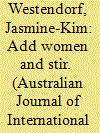

|
|
|
|
|
| Publication |
2013.
|
| Summary/Abstract |
With the changing nature of warfare and the increasing awareness of the specific gender dimensions of war and peace, the international legal framework has been expanded to address the particular challenges faced by women in conflict and post-conflict contexts. This process culminated in 2000 with the first United Nations document to explicitly address the role and needs of women in peace processes: United Nations Security Council Resolution (UNSCR) 1325 on women, peace and security. Thirteen years on, this article assesses the extent to which Australia's stated commitment to women, peace and security principles at the level of the international norm has translated into meaningful action on the ground in the Regional Assistance Mission to Solomon Islands (RAMSI). The analysis shows that despite it being an ideal context for a mission informed by UNSCR 1325, and Australia being strongly committed to the resolution's principles and implementation, the mission did not unfold in a manner that fulfilled Australia's obligations under UNSCR 1325. The RAMSI case highlights the difficulty in getting new security issues afforded adequate attention in the traditional security sphere, suggesting that while an overarching policy framework would be beneficial, it may not address all the challenges inherent in implementing resolutions such as UNSCR 1325
|
|
|
|
|
|
|
|
|
|
|
|
|
|
|
|
| 4 |
ID:
128127
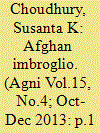

|
|
|
|
|
| Publication |
2013.
|
| Summary/Abstract |
The 11 September attacks in the United States caused NATO to invoke article 5 of the NATO charter for the first time in history. The article states that an attack on any member shall be considered to be attack on all. The invocation was confirmed on 4 October 2001 when NATO determined that the attacks were indeed eligible under the terms of North Atlantic Treaty Organisation, Eagle Assist and Operation Active Endeavour, a naval operation in the Mediterranean sea and is designed to prevent the movement of terrorists or weapons of mass destruction as well as to enhance the security of shipping the general which began on 4 October 2001.
|
|
|
|
|
|
|
|
|
|
|
|
|
|
|
|
| 5 |
ID:
128388
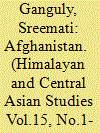

|
|
|
|
|
| Publication |
2011.
|
| Summary/Abstract |
In the context of conventional notion of Afghanistan's foreign policy strategy, two countries are accorded the most prominent status- the U.S. and Pakistan. Russia, on the other hand, shares a unique relationship with Afghanistan. The role of the buffer state, as played out by Afghanistan, during the 19"' century, halted Russian adventure towards ' South Asia, and Russian invasion of Afghanistan proved to be so much of a miscalculated affair as the misadventure led to the collapse of the Soviet Union itself. But even now, Russia has a great stake in Afghanistan's stability and is still considered to be a stabilizing factor in Afghanistan's security scenario. This paper analyzes the different phases of Russian involvement in Afghanistan in t international strategic environment.
|
|
|
|
|
|
|
|
|
|
|
|
|
|
|
|
| 6 |
ID:
125283
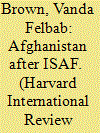

|
|
|
|
|
| Publication |
2013.
|
| Summary/Abstract |
Summer 2013 brought one of the most violent fighting seasons in Afghanistan since the US military and state-building effort began in 2001. On the cusp of the momentous 2014 presidential elections and a year before the majority of international coalition forces would depart from the country in the midst of transferring security functions to the coalition-supported Afghan National Security Forces (ANSF), the Taliban is dug in and still ferocious. It is testing the Afghan security forces, which since June 2013 are supposed to be taking the lead in providing security throughout the country while international forces are increasingly disengaging from combat and departing Afghanistan.
|
|
|
|
|
|
|
|
|
|
|
|
|
|
|
|
| 7 |
ID:
130888
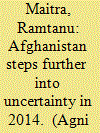

|
|
|
|
|
| Publication |
2014.
|
| Summary/Abstract |
2014 was long anticipated as the year of transition and ushering in of hope for Afghanistan. Three months of this important year are already behind us and, betraying earlier expectations, afghans continue to face stark uncertainties.
|
|
|
|
|
|
|
|
|
|
|
|
|
|
|
|
| 8 |
ID:
124837
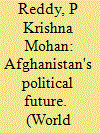

|
|
|
|
|
| Publication |
2013.
|
| Summary/Abstract |
The relationship between Afghanistan and the Shanghai Cooperation Organization (SCO) is a relatively new area of research. This article discusses the interplay between Afghanistan, China and the SCO vis -vis the Bonn 2001 to Bonn 2011 conference. Afghanistan was granted observer status in 2012 in order to facilitate its integration in the wider region and lessen US- NATO influence in the country.
|
|
|
|
|
|
|
|
|
|
|
|
|
|
|
|
| 9 |
ID:
133602
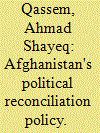

|
|
|
|
|
| Publication |
2014.
|
| Summary/Abstract |
The Afghan government's peace and reconciliation overtures to the militants, initially at the unofficial level but later sanctioned officially, have formed a key theme of state security policy from the early days of the post-Taliban administration in Afghanistan. Yet far from producing peace and stability, they seem to have played into the hands of the violent groups intent on overthrowing the country's internationally supported and legitimate political system in the past decade. There is no doubt about the importance of national reconciliation as a wider process of overcoming the legacy of beleaguered social relationships and forging a common vision for the future among all Afghans, but the nature of the government's reconciliation policy, which borders on appeasement of the militants, seems so far to have created more vulnerabilities than strengths in the face of increasingly emboldened anti-state violent groups.
|
|
|
|
|
|
|
|
|
|
|
|
|
|
|
|
| 10 |
ID:
131852
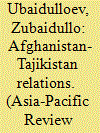

|
|
|
|
|
| Publication |
2014.
|
| Summary/Abstract |
This article attempts to touch upon the relations between Afghanistan and Tajikistan, two neighboring countries, from the historical perspective and the current period. The article analyses the history of Afghanistan-Tajikistan relations during and after the Soviet era, especially during the Afghan Mujahideen's struggle against the Soviet occupational army and Taliban regime in Afghanistan, the Tajikistan civil war of 1992-1997, and after September 11, 2001. In addition, the issues of the ethnic Tajiks in Afghanistan, the violent and vulnerable Tajik-Afghan border, the withdrawal of NATO troops from Afghanistan in 2014 and its impact on Afghanistan-Tajikistan relations, and the new phase of economic relations and an effective cooperation between the both countries are discussed. The article tries to fill the gaps within the body of existing literature and understanding concerning the topic.
|
|
|
|
|
|
|
|
|
|
|
|
|
|
|
|
| 11 |
ID:
132034
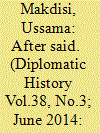

|
|
|
|
|
| Publication |
2014.
|
| Summary/Abstract |
The question of how to represent the U.S. role in the Middle East brings to the fore the question that Edward Said first raised in 1978 in Orientalism about the nature of American understandings of the Middle East. More than three decades after the publication of his book, Said's criticism of Orientalist scholarship-and his accompanying plea for a secular humanistic interpretation to replace it-remain both topical and enigmatic. It is one thing to criticize American representations of foreign cultures; it is an entirely different matter to study American engagements with them. These are by no means unrelated endeavors, but by the same token, they entail very different conceptions of what constitutes a field of inquiry and how to go about studying it comprehensively. The recent emergence of a more critical scholarship of America and the Middle East, therefore, begs the question of whether it is possible to write a history that takes both the Americans and Arabs equally seriously despite the prevailing political climate, and ultimately what kind of methodology this might entail for the rewriting of U.S.-Arab relations, and more broadly, American involvement in the world.
|
|
|
|
|
|
|
|
|
|
|
|
|
|
|
|
| 12 |
ID:
131427
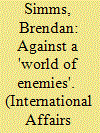

|
|
|
|
|
| Publication |
2014.
|
| Summary/Abstract |
Adolf Hitler's experiences during the First World War have been much discussed, with historians tending to concentrate on his involvement in the fighting and the operational lessons he later claimed to draw. Much less has been written about the impact of the war on his world view, though recent work has tended to suggest that his paranoid anti-Semitism was not yet visible during the conflict. Drawing on this latest research, but also on newly discovered sources and previously underused material, the author shows that Hitler's main preoccupation during the war and its immediate aftermath was the overwhelming power of Great Britain and its American ally. He associated these two powers with the alleged international Jewish economic conspiracy that had crushed the German empire. Hitler's anti-Semitism thus originated in an anti-capitalist, rather than anti-communist, discourse. He blamed Britain and the US for the rigours of the Versailles peace settlement, a moment which was far more politically formative for him than the experience of defeat itself. His encounter with American soldiers in the summer of 1918 also marked his first engagement with the global power of the United States and the start of a belief in the demographic weakness of the German empire which inspired his plans for Lebensraum in the east.
|
|
|
|
|
|
|
|
|
|
|
|
|
|
|
|
| 13 |
ID:
133777
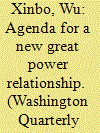

|
|
|
|
|
| Publication |
2014.
|
| Summary/Abstract |
Well begun is half done," Aristotle once said, meaning that beginning a project well makes it easier to do the rest. Yet, this may not be true of China-U.S. relations during Obama's presidency. Although the Obama administration secured a smooth transition from the George W. Bush years and attached high priority to relations with China during its first year in office, bilateral relations turned downward over the rest of Obama's first term, leaving a legacy of growing mutual suspicion and rising competition between the two countries, especially in the Asia-Pacific region. In spite of the November 2009 bilateral agreement to build a "positive, cooperative, and comprehensive relationship,"1 the two sides missed opportunities for more cooperation while mishandling and even misguiding bilateral ties on some points.
|
|
|
|
|
|
|
|
|
|
|
|
|
|
|
|
| 14 |
ID:
132781
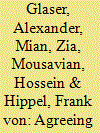

|
|
|
|
|
| Publication |
2014.
|
| Summary/Abstract |
Iran is negotiating with a group of six states over the future of its nuclear program. In November 2013, Iran and the P5+1 (China, France, Germany, Russia, the United Kingdom, and the United States) agreed to a Joint Plan of Action that seeks to reach a "comprehensive solution" by July 20, 2014.
The goal is an agreement on a set of measures that can provide reasonable assurance that Iran's nuclear program will be used only for peaceful purposes and enable the lifting of international sanctions imposed on Iran over the past decade because of proliferation concerns.
A key challenge is to reach agreement on limiting Iran's uranium-enrichment program, which is based on gas centrifuges, in a way that would enable Iran to meet what it sees as its future needs for low-enriched uranium (LEU) fuel for nuclear research and power reactors while forestalling the possibility that this program could be adapted to quickly produce highly enriched uranium at levels and in amounts suitable for use in nuclear weapons
|
|
|
|
|
|
|
|
|
|
|
|
|
|
|
|
| 15 |
ID:
127061
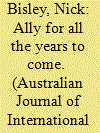

|
|
|
|
|
| Publication |
2013.
|
| Summary/Abstract |
In 2011, Australia communicated a clear choice about its strategic future. It would continue to cleave tightly to the US alliance, expand its military links and work to advance the USA's conception of regional order. Given its economic interests, why has Australia bound itself to the US alliance? What lies behind this strong commitment and what would it take for Australia to change its relationship with the USA? This article presents an analysis of the current state of the US-Australia alliance and argues that Canberra's pursuit of close relations with the USA reflects the interaction of a rational calculation of the costs and benefits of the alliance with a set of resolutely political factors that have produced the current policy setting. The article first assesses the security cost and benefit behind the alliance. It then argues that the move also derives from the strong domestic support for the US alliance, a sharpened sense that China's rise was generating regional instability that only the US primacy could manage and the realisation that the economic fallout of such a move would be minimal. It concludes with a brief reflection on what it might take to change the current policy settings.
|
|
|
|
|
|
|
|
|
|
|
|
|
|
|
|
| 16 |
ID:
132417
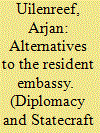

|
|
|
|
|
| Publication |
2014.
|
| Summary/Abstract |
Increasingly integrated in a common political entity, the European Union's member states are exploring new avenues to shape and maintain their mutual relations. This analysis describes three alternatives to the traditional resident embassy by which ministries of foreign affairs within the EU attempt to maintain diplomatic networks. The models discussed are secondments within member states' capitals, visiting ambassadors, and co-location and co-operation. In other words, with regard to different modes of representation, member states can consider diving in, stepping back, or pooling and sharing. These developments shed light on the ways in which the diplomatic machineries of the member states are trying to adapt to the demands of a "post-Westphalian" environment such as that of the EU.
|
|
|
|
|
|
|
|
|
|
|
|
|
|
|
|
| 17 |
ID:
125195
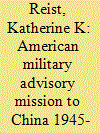

|
|
|
|
|
| Publication |
2013.
|
| Summary/Abstract |
The Pacific War ended in 1945 before the American government had established a plan for the implementation of its postwar goals for its relationship with China. Although China lacked unification, the Guomindang (GMD), the "allied" government, sought to create a more modern military along American lines, with American equipment, using American advisers and funding. GMD leaders did not want American influence or control, desiring to maintain their culturally organized structures and ways of functioning, including the use of guanxi (personal networks and favors). The Joint U.S. Military Advisory Group attempted to operate within this nexus of conflicting goals, purposes, and missions.
|
|
|
|
|
|
|
|
|
|
|
|
|
|
|
|
| 18 |
ID:
130240
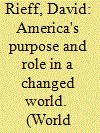

|
|
|
|
|
| Publication |
2014.
|
| Summary/Abstract |
Let me begin by putting my own moral and ideological cards on the table, since I assume that I have been asked to participate in this symposium because of, and not in spite of, the fact that I reject the idea that America's global hegemony is not just good for the United States but assures global peace and stability as well, and thus is good for the world. In his recent book-length article for a special issue of the New Left Review titled "American Foreign Policy and Its Thinkers," a brilliant, implacable anatomization of the American Empire, Perry Anderson approvingly quotes Christopher Layne's observation that "in international relations, benevolent hegemons are like unicorns-there is no such animal." That is certainly my view. And I would add that a democratic empire (for other than its own citizens, at least) is quite simply a contradiction in terms.
|
|
|
|
|
|
|
|
|
|
|
|
|
|
|
|
| 19 |
ID:
130241
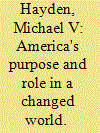

|
|
|
|
|
| Publication |
2014.
|
| Summary/Abstract |
I had never been a big fan of American exceptionalism. It was too self-referential, self-identifying, self-focused for my personal comfort. Then one bitterly cold day in February 1994, I was wandering through the open-air market in Sarajevo. The market had been hit by a single mortar round the previous weekend and sixty-eight people had been killed. Holes made by fragments from the 120-mm shell were still visible in the asphalt.
As I stared at the gouged surface in my battle dress and parka, Sarajevans began to come up to me, point to the small American flag on my upper sleeve, give a hesitant thumbs-up gesture, and whisper, almost prayerfully, "USA, USA."
Edward Snowden's leaks have fixated the media and the public on privacy and espionage, but the larger and more complex debate on protecting American security in the 21st century has been wanting.
At that point it became clear to me that it mattered less whether I thought America was exceptional. What mattered was that many people around the world thought that we were, and expected us to act accordingly. In many ways this is less something we have earned or even want, and more the product of historical circumstance. But a burden has clearly been ours, and when it is no longer ours the best judgment we can hope for is something along the lines of "As global hegemons go, these guys weren't bad." Now, under President Obama, the United States is involved in a redefinition or at least a recalibration of that exceptional role.
|
|
|
|
|
|
|
|
|
|
|
|
|
|
|
|
| 20 |
ID:
130843
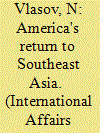

|
|
|
|
|
| Publication |
2014.
|
| Summary/Abstract |
The article examines U.S. foreign relations with Southeast Asia. An increase in U.S. involvement in the region under the administration of President Barack Obama is considered. A contradiction in U.S. policy is said to exist between insistence by the administration that its desire for stability and freedom of the seas in Southeast Asia is not intended as containment of China and China's aggressive maritime boundary claims in the South China Sea.
|
|
|
|
|
|
|
|
|
|
|
|
|
|
|
|
|
|
|
|
|